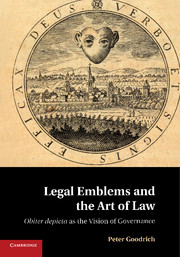Crossref Citations
This Book has been
cited by the following publications. This list is generated based on data provided by Crossref.
Dorsett, Shaunnagh
and
McVeigh, Shaun
2014.
Jurisprudences of jurisdiction: matters of public authority.
Griffith Law Review,
Vol. 23,
Issue. 4,
p.
569.
Raffield, Paul
and
Watt, Gary
2014.
Editorial.
Law and Humanities,
Vol. 8,
Issue. 2,
p.
iii.
Pearson, Ashley
and
Tranter, Kieran
2015.
Code, Nintendo’s Super Mario and Digital Legality.
International Journal for the Semiotics of Law - Revue internationale de Sémiotique juridique,
Vol. 28,
Issue. 4,
p.
825.
Perry-Kessaris, Amanda
2015.
Approaching the Econo-Socio-Legal.
Annual Review of Law and Social Science,
Vol. 11,
Issue. 1,
p.
57.
Richardson, Janice
2016.
Hobbes’ Frontispiece: Authorship, Subordination and Contract.
Law and Critique,
Vol. 27,
Issue. 1,
p.
63.
Andina, Tiziana
2016.
An Ontology for Social Reality.
p.
157.
Doyle, Kylie
and
Tranter, Kieran
2017.
F#ck Your Family!: The Visual Jurisprudence of Automobility.
International Journal for the Semiotics of Law - Revue internationale de Sémiotique juridique,
Vol. 30,
Issue. 1,
p.
1.
Shum, Annie
and
Tranter, Kieran
2017.
Seeing, Moving, Catching, Accumulating: Pokémon GO, and the Legal Subject.
International Journal for the Semiotics of Law - Revue internationale de Sémiotique juridique,
Vol. 30,
Issue. 3,
p.
477.
Sleep, Lyndal
and
Tranter, Kieran
2017.
The Visiocracy of the Social Security Mobile App in Australia.
International Journal for the Semiotics of Law - Revue internationale de Sémiotique juridique,
Vol. 30,
Issue. 3,
p.
495.
Tranter, Kieran
2017.
Seeing Law: The Comic, Icon and the Image in Law and Justice.
International Journal for the Semiotics of Law - Revue internationale de Sémiotique juridique,
Vol. 30,
Issue. 3,
p.
363.
Damián Aniceto, Paulo
2017.
La práctica jurídica como el evento de su dramatización: la "mise- en-scène" del campo judicial..
FORO. Revista de Ciencias Jurídicas y Sociales, Nueva Época,
Vol. 20,
Issue. 1,
p.
219.
Tranter, Kieran
2017.
Law, the Digital and Time: The Legal Emblems of Doctor Who.
International Journal for the Semiotics of Law - Revue internationale de Sémiotique juridique,
Vol. 30,
Issue. 3,
p.
515.
Sykes, Robbie
2017.
‘Those Chosen by the Planet’: Final Fantasy VII and Earth Jurisprudence.
International Journal for the Semiotics of Law - Revue internationale de Sémiotique juridique,
Vol. 30,
Issue. 3,
p.
455.
Tranter, Kieran
2017.
Seeing Law: The Comic, Icon and the Image in Law and Justice.
International Journal for the Semiotics of Law - Revue internationale de Sémiotique juridique,
Vol. 30,
Issue. 3,
p.
363.
Shaw, Julia J. A.
2018.
The Palgrave Handbook of Philosophy and Literature.
p.
541.
Behrmann, Carolin
2018.
The Art of Law.
Vol. 66,
Issue. ,
p.
43.
Finchett-Maddock, Lucy C
2018.
Re-worlding: A Theory of Art/Law.
SSRN Electronic Journal,
Campo, Alessandro
2020.
Metaphorical Use of Algorithm in Legal Reasoning.
International Journal for the Semiotics of Law - Revue internationale de Sémiotique juridique,
Vol. 33,
Issue. 4,
p.
1187.
Jaria-Manzano, Jordi
2020.
Di-vision: The making of the “Anthropos” and the origins of the Anthropocene.
Oñati Socio-Legal Series,
Vol. 11,
Issue. 1,
p.
148.
Commins, Johanna
2021.
Composing the Handmaid: From Graphic Novel to Protest Icon.
The Comics Grid: Journal of Comics Scholarship,
Vol. 11,
Issue. 1,





